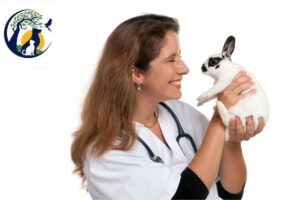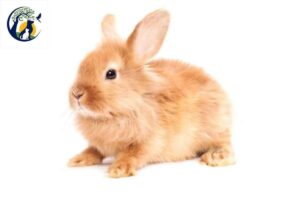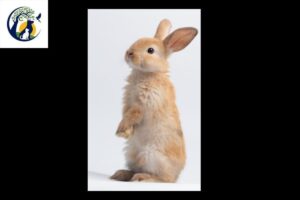Introduction:

unveiling the delicate balance in rabbits.
There are some common diseases and problems seen in rabbits that can be prevented by ensuring you have an understanding of what a healthy rabbit requires and the subtle signs that can tell you your rabbit is unwell. Rabbits are wonderful domesticated pets, but it should be remembered that they are very closely related to wild rabbits, and as such will hide signs of illness until they are very unwell, as this would make them “easy prey” in nature. We encourage close observations of your pet rabbit, a correct diet, up to date vaccinations and regular health checks to ensure you pick up the early signs of problems, and prevent diseases developing.
- Loss of appetite
- Swellings
- Loss of balance or head tilt
- Flystrike
- Breathing difficulties in rabbits
- Myxomatosis
- Rabbit viral hemorrhagic disease
- Paralysis of one or more limbs.
some common health issues found in rabbits are given below:
- Gastrointestinal Stasis
One of the most critical health issues affecting rabbits is gastrointestinal stasis, commonly referred to as “GI stasis.” This condition occurs when the rabbit’s digestive system slows down or stops functioning altogether. Rabbits have a delicate digestive balance that requires a high-fiber diet to keep their gut motility healthy. A lack of proper fiber intake can lead to the formation of hairballs, which can obstruct the digestive tract and cause immense discomfort.
Prevention and Management: To prevent GI stasis, ensure that your rabbit has a consistent supply of fresh hay, which is a vital source of fiber. Regular exercise and a diet rich in leafy greens can also help maintain healthy digestion. If you notice any signs of GI stasis, such as reduced appetite, bloating, or lethargy, consult a veterinarian immediately.
- Dental Problems
pets have continuously growing teeth, which means that proper dental care is essential to prevent dental issues. Malocclusion, a condition where the teeth do not align properly, is a common problem in rabbits. Overgrown teeth can cause pain, difficulty eating, and even abscesses.
Prevention and Management: Regularly offer your rabbit appropriate items to chew on, such as untreated wooden toys and safe branches. These activities promote natural wear and tear on their teeth. Routine veterinary check-ups can help identify dental issues in their early stages.
- Respiratory Infections
Pets are sensitive to changes in their environment, especially when it comes to air quality. Respiratory infections can occur due to factors like poor ventilation, dusty bedding, or exposure to smoke. Symptoms of respiratory infections include sneezing, coughing, nasal discharge, and labored breathing.
Prevention and Management: Ensure your pet’s living environment is clean, well-ventilated, and free from irritants. Use appropriate bedding materials and avoid exposing your rabbit to smoke or other pollutants. If your rabbit exhibits any respiratory symptoms, consult a veterinarian promptly.
- Heat Stress
pets are prone to heat stress due to their inability to regulate their body temperature efficiently. High temperatures can lead to heatstroke, which is a life-threatening condition. Signs of heat stress include rapid breathing, lethargy, and even unconsciousness.
Prevention and Management: Keep your rabbit’s living area in a cool, shaded spot during hot weather. Provide access to fresh, clean water at all times. If the temperature rises, you can place a frozen water bottle wrapped in a towel in their enclosure to help them cool down.
- Parasitic Infections
External parasites like mites and fleas can infest rabbits and cause intense itching, hair loss, and skin irritation. Internal parasites like coccidia and intestinal worms can also affect their health.
Prevention and Management: Regularly inspect your rabbit’s fur and skin for any signs of parasites. Maintain a clean living environment, and consult a veterinarian for appropriate parasite prevention and treatment.
Rabbits make wonderful companions. They’re intelligent, social, curious, and oh-so-cute, but sometimes it’s difficult for us to interpret their unique language. Rabbits, by nature, are prey animals. In the wild, they spend a large portion of their day avoiding predators, and any sign of weakness or illness would make them an easy target.
unveiling the delicate balance in rabbits.
Injury in Pet include:

unveiling the delicate balance in rabbits.
- You notice changes to your rabbit’s appetite
- Your rabbit’s poop looks different
- You notice your rabbit’s fur appears dull or is missing in places
- You notice your rabbit is drooling, has facial swelling, or is having difficulty eating
- You notice signs of upper respiratory issues with your rabbit
You Notice Signs of Upper Respiratory Issues with Your Pet

unveiling the delicate balance in rabbits.
Rabbit are obligate nasal breathers and have especially delicate respiratory systems which can make them prone to upper respiratory infections.
Conclusion
unveiling the delicate balance in rabbits.
Owning a rabbit comes with the responsibility of ensuring their health and well-being. By understanding the unique needs of these adorable creatures, you can take proactive steps to prevent and manage common health issues. Regular veterinary check-ups, a proper diet, a clean living environment, and attentive care are essential to keeping your rabbit happy and healthy throughout its life.
Thank you for reading for more such pet related articles keep visiting our website
Twitter-https://twitter.com/petcaredunia?t=ec5aPU0-IkIxg_6VpEa8IA&s=09
You Tube- https://youtube.com/@petcareworld?feature=share9
